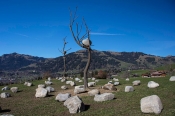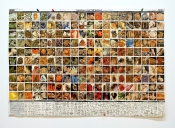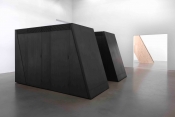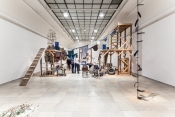Giuseppe Penone,
2018
Giuseppe Penone started working professionally in 1968 in the Garessio forest, near where he was born, in Italy. He is the younger member of the Italian movement named "Arte Povera", a term that was coined by Germano Celant. Penone's work is concerned with establishing a contact between man and nature.
His sculptures, installations and drawings have always been distinguished by his radical choice of unconventional materials and use of processes that are an integral part of his work. Each work reaches completion through the assimilation of its actions to those of the natural elements and grows out of reflection that adhere closely to the concrete, visual, tactile and olfactory qualities of the materials, explored by the artistic ways that bring out their magical and fantastic groundwork.
The tree, a living organism, in appearance so closely resembling the human figure, is a central element in Penone's work. Many of the procedures he adopts in the creation of his works are based on the act of relating different entities and forces, hence on traces or memories of the contacts between them.
In Penone's work, above all its more recent developments, the opposed concepts of identità ("identity") and identicità ("analogy") are assimilated according to a logic that is not extraneous to the Italian language, as in other European languages in which the two cognate words share the same etymon. The assimilation is shown in the process by which the artist emphasizes similar behaviors that belong to different entities by fossilizing them in a form. As a result, images are created that are capable of making the thoughts and imagination of those who observe them flow from one material to another, from one subject to another, from an animal body to a vegetable or mineral body.
Fred Moten,
2017
Fred Moten is Professor of English at the University of California, Riverside, where he teaches courses and conducts research in black studies, performance studies, poetics and literary theory. He is author of In the Break: The Aesthetics of the Black Radical Tradition (University of Minnesota Press, 2003); Hughson’s Tavern (Leon Works, 2009); B. Jenkins (Duke University Press, 2010); The Feel Trio (Letter Machine Editions, 2014), which was a poetry finalist for the National Book Award and Los Angeles Times Book Prize and winner of the California Book Award for poetry; The Little Edges (Wesleyan University Press, 2015), which was a finalist for the Kingsley Tufts Poetry Award and The Service Porch (Letter Machine Editions, 2016), A Poetics of the Undercommons (Sputnik and Fizzle, 2016) and a three volume collection of essays whose general title is consent not to be a single being (Duke University Press, 2017, 2018). Moten is also co-author, with Stefano Harney, of The Undercommons: Fugitive Planning and Black Study (Minor Compositions/Autonomedia, 2013) and, with Wu Tsang, of Who touched me? (If I Can’t Dance, I Don’t Want to be Part of Your Revolution, 2016). Moten has served on the editorial boards of Callaloo, Discourse, American Quarterly and Social Text; as a member of the Critical Theory Institute at the University of California, Irvine; on the board of directors of the Center for Lesbian and Gay Studies, City University of New York; and on the advisory board of Issues in Critical Investigation, Vanderbilt University. Moten has been the Whitney J. Oates Fellow in the Humanities Council and the Center for African American Studies at Princeton University, the Sherry Memorial Visiting Poet at the University of Chicago and a Visiting Artist at the Milton Avery Graduate School of the Arts, Bard College. In 2016 he was awarded a Guggenheim Fellowship and the Stephen E. Henderson Award for Outstanding Achievement in Poetry by the African American Literature and Culture Society.
Conrad Bakker,
2018
Conrad Bakker makes carved/painted sculptures and paintings of everyday objects and places them in consumer contexts and/or gallery exhibitions to reveal and critically comment upon the political economies and relational networks between persons and things. Bakker has exhibited his work internationally in venues that include Tate Modern (London), Galerie Analix Forever (Geneva), Fargfabriken Center for Contemporary Art and Architecture (Stockholm), the New Museum of Contemporary Art (New York), the Renaissance Society at the University of Chicago (Chicago), the Contemporary Art Museum Houston, Art in General, Artists’ Space, and Apex Art (New York City), and in mailboxes, ebay auctions, and on his front lawn. His work has been the subject of articles and reviews in Frieze, Contemporary, Flash Art, Art Forum, Art World Magazine, ArtUS, Art Papers, Sculpture, UOVO, The Chicago Tribune, The New York Times, and The New Yorker magazine. Bakker has been awarded individual artist grants from the Creative Capital Foundation, The Illinois Arts Council, and the Joan Mitchell Foundation Painters and Sculptors Grant Program. Recent projects include: Untitled Project: The Crystal Land for Station Independent Projects (New York City). Salt 10: Conrad Bakker, Untitled Project: Robert Smithson Library & Book Club for the Utah Museum of Fine Arts (Salt Lake City). Untitled Project: Still Life / Style Leaf at Devening Projects (Chicago), and Untitled Project: Cabin [Thoreau] for La Littorale #6 Internationale Biennale D'Art Contemporain, Anglet Côte-Basque (France). Conrad Bakker lives and works in Urbana, IL where he teaches at the University of Illinois and directs the MFA Studio program.
Adam McEwen,
2018
Adam McEwen was born in London in 1965 and lives and works in New York. He received his BA from Christ Church, Oxford in 1987 and graduated from California Institute of the Arts, Valencia, CA in 1991. Recent exhibitions have taken place at: Aspen Art Museum, Aspen (2017); de la Cruz Collection, Miami; MoMA PS1, New York (both 2016); Whitney Museum of American Art, New York; Museo Civico Diocesano di Santa Maria dei Servi, Città della Pieve, Italy; Fondation Louis Vuitton, Paris (all 2015); Winter Palace and 21er Haus, Vienna, Austria (2014); and the Goss-Michael Foundation, Dallas (2012).
Abraham Cruzvillegas,
2017
Abraham Cruzvillegas (b. 1968) is one of the most important conceptual artists of his generation to come out of the vibrant art and architecture scene in Mexico developing work inspired by the improvised building materials of Latin America. For the 2017 CAB Cruzvillegas will speak about a new international series, The Water Trilogy.






